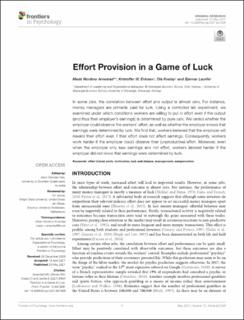| dc.contributor.author | Arnestad, Mads Nordmo | |
| dc.contributor.author | Eriksen, Kristoffer Wigestrand | |
| dc.contributor.author | Kvaløy, Ola | |
| dc.contributor.author | Laurila, Bjørnar | |
| dc.date.accessioned | 2023-01-10T14:16:54Z | |
| dc.date.available | 2023-01-10T14:16:54Z | |
| dc.date.created | 2021-07-14T17:10:17Z | |
| dc.date.issued | 2021 | |
| dc.identifier.citation | Frontiers in Psychology. 2021, 12 1-10. | |
| dc.identifier.issn | 1664-1078 | |
| dc.identifier.uri | https://hdl.handle.net/11250/3042451 | |
| dc.description.abstract | In some jobs, the correlation between effort and output is almost zero. For instance, money managers are primarily paid for luck. Using a controlled lab experiment, we examined under which conditions workers are willing to put in effort even if the output (and thus their employer’s earnings) is determined by pure luck. We varied whether the employer could observe the workers’ effort, as well as whether the employer knows that earnings were determined by luck. We find that, workers believed that the employer will reward their effort even if their effort does not affect earnings. Consequently, workers work harder if the employer could observe their (unproductive) effort. Moreover, even when the employer only saw earnings and not effort, workers labored harder if the employer did not know that earnings were determined by luck. | |
| dc.language.iso | eng | |
| dc.title | Effort Provision in a Game of Luck | |
| dc.type | Peer reviewed | |
| dc.type | Journal article | |
| dc.description.version | publishedVersion | |
| dc.source.pagenumber | 1-10 | |
| dc.source.volume | 12 | |
| dc.source.journal | Frontiers in Psychology | |
| dc.identifier.doi | 10.3389/fpsyg.2021.637339 | |
| dc.identifier.cristin | 1921785 | |
| cristin.ispublished | true | |
| cristin.fulltext | original | |
| cristin.qualitycode | 1 | |
